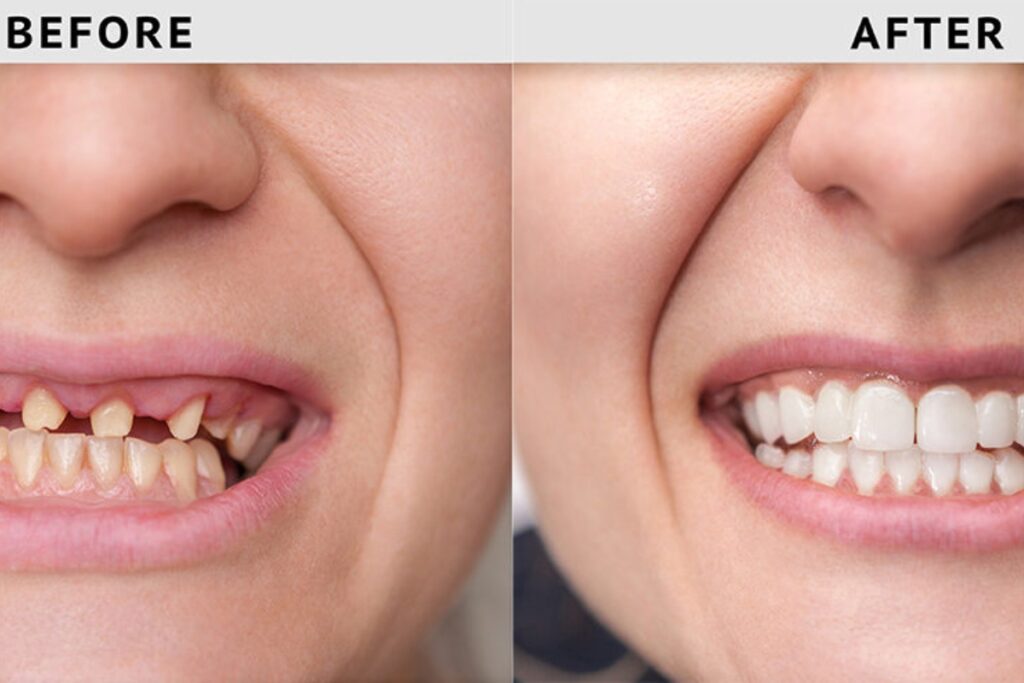Tooth loss not only affects appearance but also leads to reduced chewing function, shifting of adjacent teeth, and even alveolar bone atrophy. Currently, dentures (removable prosthetics) and dental implants are the most common replacement options. But which one is right for you? This guide compares them in terms of comfort, durability, cost, and surgical procedures to help you make an informed decision.

I. Pros and Cons of Dentures (Removable Prosthetics)
Advantages
- Affordable cost: Single denture costs $200–$800; full-mouth dentures $1,000–$3,000, ideal for those on a budget.
- No surgery required: Only needs impressions for customization, ready to wear in 1–2 weeks—suitable for the elderly or those with poor health.
- Easily adjustable: Can be modified or redone if gum shrinkage or tooth changes occur.
Disadvantages
- Poor comfort: Strong foreign body sensation, may rub gums causing ulcers or pain.
- Low chewing efficiency: Restores only 30–40% of natural tooth biting force; hard foods are difficult to chew.
- Prone to loosening: May shift during speaking, laughing, or eating, requiring adhesives for stability.
- Accelerates bone loss: Long-term wear compresses gums, leading to further bone resorption.
II. Pros and Cons of Dental Implants
Advantages
- Resembles natural teeth: Implants integrate with alveolar bone, restoring over 90% chewing force—capable of biting apples, nuts, etc.
- Doesn’t damage adjacent teeth: Traditional porcelain bridges require grinding down the healthy teeth on either side, while dental implants are independently supported, protecting adjacent teeth.
- Long-lasting durability: High-quality implants can last 20–30 years, even a lifetime with proper maintenance.
- Prevents bone loss: Implants mimic tooth roots, stimulating bone tissue and slowing atrophy.
Disadvantages
- Higher cost: Single implant costs $1,000–$4,000 (more expensive in Europe/North America); full-mouth implants range from $15,000–$30,000.
- Requires surgery: Needs 3–6 months for osseointegration (bone bonding), unsuitable for those with severe osteoporosis or diabetes.
- High maintenance needs: Requires regular professional cleaning to avoid peri-implantitis.
III. Dentures vs. Implants: Key Comparisons
| Comparison | Dentures | Dental Implants |
|---|---|---|
| Cost | $200–$3,000 (budget-friendly) | $1,000–$4,000/unit (premium) |
| Comfort | Noticeable foreign body feel | Close to natural teeth |
| Lifespan | 5–10 years (needs replacement) | 20+ years (long-term investment) |
| Surgical risk | No surgery | Requires minor surgery |
| Maintenance difficulty | Daily cleaning required | Regular professional care needed |
| Suitable for | Budget-conscious, elderly, multiple missing teeth | Those seeking long-term results, single tooth loss |
IV. How to Choose?(Dentures vs. Implants)
- What’s your budget?
Short-term savings: Choose dentures. Long-term investment: Choose implants. - Can you tolerate surgery?
Those with heart disease, diabetes, etc., should consult a doctor first. - What quality of life do you want?
If you want to avoid loose dentures and dietary restrictions, implants are better.
V. Industry Trend: Rise of Digital Dental Implantation
Recent advancements like 3D guide plate implantation and immediate loading (same-day tooth placement) have greatly improved the experience. For example:
- All-on-4 technique: Edentulous patients need only 4 implants to restore chewing, costing 30% less than traditional methods.
- Minimally invasive painless implantation: Laser-assisted surgery reduces swelling and recovery time.
Conclusion: No “Best” Option, Only the “Most Suitable”
Choose dentures if: You need a short-term solution, have a limited budget, or cannot undergo surgery.
Choose implants if: You seek natural feel, long-term results, and are in good health.
It’s advisable to get a CT scan to check alveolar bone condition, then consult your dentist. With advancing technology, implants are becoming more accessible—many countries (e.g., Thailand, Mexico) offer cost-effective options, making medical tourism a viable way to reduce expenses.
Related articles:
Teeth Whitening: What All You Need To Know
How to Choose the Right Orthodontics Treatment for Your Smile


